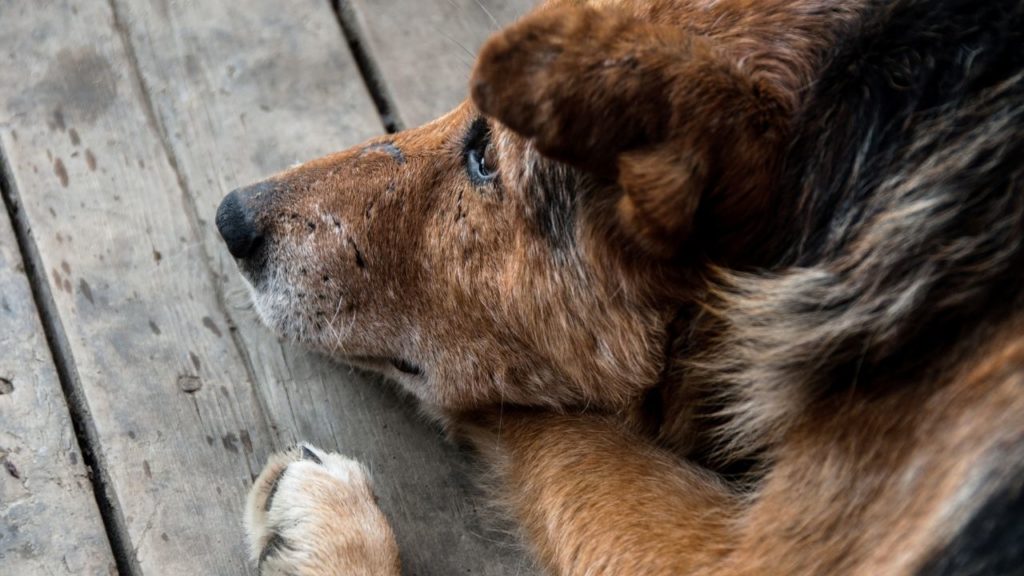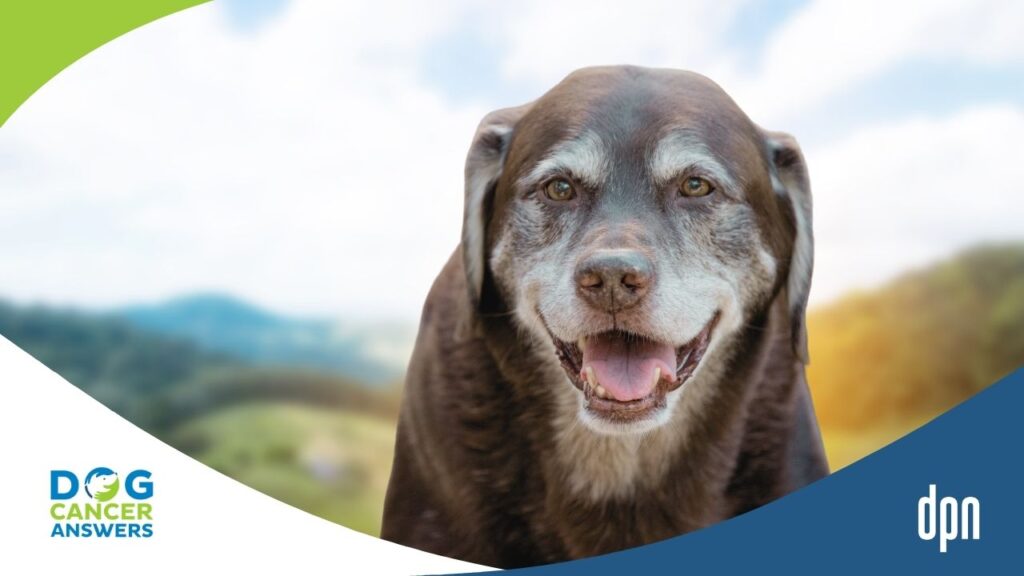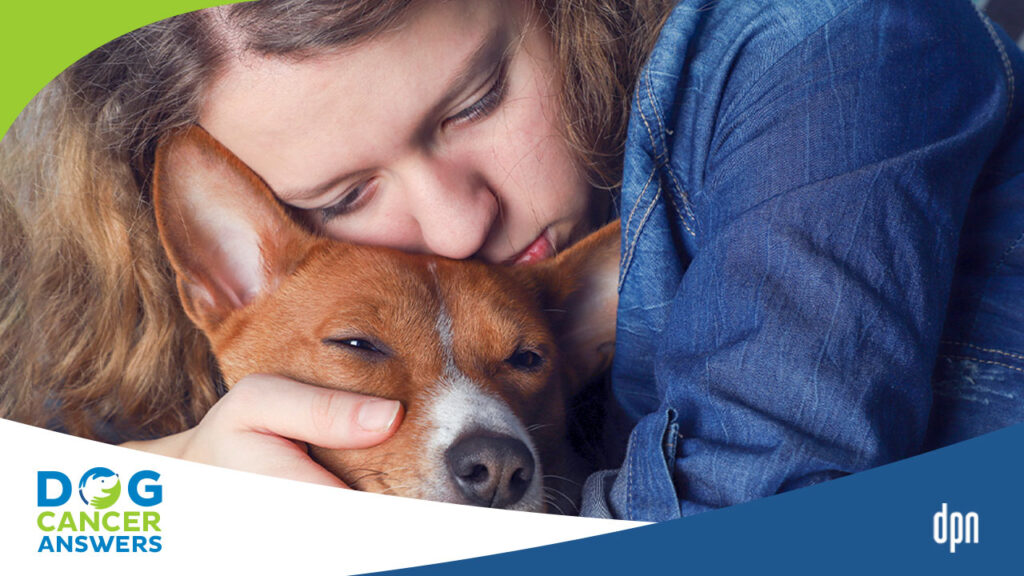EPISODE 65 | RELEASED June 23, 2020
When Should I Put My Dog Down? | Dr. Demian Dressler Q&A
How do we know when to say goodbye to our pets? And how do we say goodbye? Dr. Demian Dressler thinks we need rituals around our dog’s end of life, too.
SHOW NOTES
In this admittedly weepy Question & Answer episode of Dog Cancer Answers, Mary is clearly struggling with questions about the end of her dog’s life. Dr. Demian Dressler throws her a rope with some important guidelines for this very personal choice. He also gives tips about how to celebrate her dog’s life, thank him for being her good dog, and grieve when it’s finally time to say goodbye.
A very special episode!
Links Mentioned in Today’s Show:
You can find the Prayer of Gratitude and Life Story exercises in the book, The Dog Cancer Survival Guide: Full Spectrum Treatments to Optimize Your Dog’s Life Quality and Longevity by Dr. Demian Dressler and Dr. Susan Ettinger.
>> Dr. Demian Dressler: And what’s weird about our culture is because we’re kind of addicted to comfort, we don’t really have any room for death. In other cultures, like they contemplate death much more frequently, and it’s made more of a part of life. And some cultures will even focus on death as a way of appreciating life more. And we don’t have rituals for dogs.
>> Announcer: Welcome to Dog Cancer Answers, where we help you help your dog with cancer. Here’s your host, James Jacobson.
>> James Jacobson: Hi friend — thank you for joining us on a particularly sensitive Question & Answer episode. It’s about a situation that so many of us on the dog cancer Iditarod will have to face eventually: the end of our beloved dog’s life. Mary called our Listener Line to ask if there are any last-minute options for her dog, and in response, Dr. Demian Dressler guides all of us through the process of saying goodbye, grieving, and honoring our dog’s life. Here is Mary’s question now:
>> Mary: Hi, this is Mary. I am calling because my dog is very weak and not responding well to treatments anymore. And the vet basically says that he only has a week or two left to live. And I know that there’s not much you can do, but I just wanted to know. Is there anything that I can do for him at this point? We’ve tried everything. You know, he’s been fighting for like 18 months and he’s done such a good job, but I don’t know if he’s going to make it. And the vet seems to think mostly close to the end. And I’m just wondering, is there anything else that can be done for my dog? If there’s any last-minute Hail Mary’s or anything that we can use? Okay. Thank you for this. Buh-bye.
>> Dr. Demian Dressler: Wow. So there’s two pieces to this. The first, and I can hear by the emotion in your voice, that your thoughts may be that we’re approaching the end. And I think that that is something that we all have to confront in our lives and the lives of our loved ones, whether they’re on two legs or four legs.
One question though is, how far do you want to go with treatment? And then when do you stop? When do you just stop? And we need to look at all of the options. And sometimes it’s very difficult because our emotions get entangled in the treatment decision. So how far does one go? Well, you have to do treatment plan analysis. We say, okay, well, what are the survival statistics connected with my dog’s cancer? What is my dog’s expected survival time normally — that would mean how much longer could I possibly get. And then what do we have to put in that equation? As far as side effects? Like we’re doing things that we’re doing, aggressive things. Are we willing to tolerate those side effects? And those are kind of personal decisions.
I suspect though, based on what I’m picking up behind the question, is that you may be thinking about euthanasia. And so the euthanasia decision is one that we talk about a lot in The Dog Cancer Survival Guide or at least at length in deciding when is it time to let my dog go?
And we look at the joys of life and we say, okay, well, if this is a hopeless situation, well, how many of the joys of life are gone? And there’s a list of joys in life. And every dog is a little bit different, but the big ones are they like to eat and they like to drink. That can be joyful. They like to have physical exercise. That can be joyful, that act of physical expression or mental expression, express yourself as a joyful act. Social interactions is a joyful act, normal bodily functions. Those can be joyful. And you know, if you have to go pee and he can’t go pee, well, it feels pretty good to be able to do normal things. And having a healthy mindset is also normal kind of a joy of life because it makes you feel good when you’re feeling mentally healthy, as opposed to being chronically depressed.
So, when you make the decision that actually we’ve got a situation without much hope and then also we’re in a situation where our life quality is really pretty miserable, then we have to come up with, with, okay, well now we’re looking at the end of life stage.
And what’s weird about our culture is because we’re kind of addicted to comfort, we don’t really have any room for death. In other cultures, like, they contemplate death much more frequently, and it’s made more of a part of life. And some cultures will even focus on death as a way of appreciating life more. And we don’t have rituals for dogs. Like at least in people, we have funerals where we can go and there can be a funeral. And there’s a reason for that ritual. And that is it helps people get through the process. It’s kind of something to cling to, it’s cathartic, and there can be a celebratory aspect of the life. We don’t have that for dogs. There’s no real place for the end of life stage.
What do you do? Well in the book, we talk about some things that you can do because you need to do something to prepare yourself for the big exit. And the communication with the dog is a big piece of that. And we talk about a couple of things.
One is the prayer of gratitude, and that is going through from the very beginning of life all the way up until now — you thank your dog for all of the good things from puppyhood. All the way through all of the good things that they gave you, whether it was companionship, whether it was something to look forward to, whether it was a lick on the face, whether it was the soft touch, whether it was how you both enjoyed taking that trip cross country, and you try to connect it with specific life chapters in such a way that it stimulates your memory. And it also grounds it, it makes it real and you go through the entire life.
So you make sure that you say the thank yous, and if there’s anything that you regret, then you do the apologies, you make amends, and you do the atonement and say, ‘You know what, I’m sorry I was gone for work so long during that month. I’m so sorry, you know, and do you forgive me?’ And they will.
And so you do that, and you did that, that does this ritual to help prepare.
And the other thing is too, is the life story. Another ritual, you can go back and you can just reminisce on all of the times from again, puppyhood until now, really just the whole story. “And then I got you from my aunt and then you were so little and we went and I taught you how to go potty on the paper, and then you wagged your tail.”
And that is a reminiscing. And so both of these allow an emotional release for both you and the animal, and they allow a bonding experience and it’s a bookend. To a chapter which people need in order to integrate life experience and otherwise things get unwound and chaotic, and it’s difficult to reach the end and to find a, a resolution.
And with that, I should stop talking.
>> James Jacobson: That is definitely a — I’ve done both of those exercises myself when I had to put a dog down. And they’re really powerful. Great question. Thank you.
>> Dr. Dressler: Thank you.
>> James Jacobson: So, thank you for taking that little trip with Mary, Dr. D, and me. I know all of us dread the day when we start to think about the end of our dog’s life, so I especially want to thank Mary for asking this tender question and Dr. Dressler for his thoughts. Making the decision to end our dog’s life is such a terrible responsibility, and Dr. D is right – we don’t have any rituals or rules about it. I can tell you from personal experience that using the two emotional management exercises that he mentioned, the Life Story and the Prayer of Gratitude, it’s a great way to cope with panic and fear that comes up at this time.
By expressing your gratitude to your dog, and by telling your pup the entire story of your lives together, you are reminding yourself of how much you love them, what a full life you’ve had together, and why you’re considering what you’re considering.
At least for me, using these exercises has helped me to get my mind and my heart clear. In fact, I use them even when my dog is just sick, or I feel overwhelmed – don’t save them just for the end of a dog’s life. Dogs like hearing their stories as much as children do. Tell them anytime. It feels good for both of you.
But as Dr. Dressler outlined in his answer, they ARE wonderful techniques for grieving in a healthy way and honoring your dog at the end. Dogs are man’s best friend, we know that, but somehow our society doesn’t give us good ways to grieve when they’re gone. The exercises Dr. D mentioned are powerful and I hope you’ll use them and share them with other dog lovers.
If you’re facing the decision to put your dog down, there are several articles on DogCancerBlog that could be helpful. The links are in the show notes, which you can find in your podcast app or at DogCancerAnswers.com, where you can also listen to or download our entire back catalog.
And, of course, as Dr. Dressler said, techniques such as the prayer of gratitude are listed in his book The Dog Cancer Survival Guide. It’s very important to consider the best course for your emotions as well as your dog’s in this trying time.
Just a couple things to wrap up on today’s show: please don’t forget to hit the subscribe button, write a review, and tell a friend and your veterinarian about this podcast.
It’s how we grow and it’s the best way that you can support us so that we can support as many dog lovers as possible.
<<TOUCH TONE SFX>>
Those touch tones remind me to remind you to call our Listener Line just like Mary did and leave YOUR question about dog cancer for one of our veterinarians to answer on a future episode. Call 808-868-3200 or visit our website at DogCancerAnswers.com.
And finally, we’d like to thank our sponsor: The Dog Cancer Survival Guide book by Dr. Demian Dressler and Susan Ettinger. It is available wherever fine books are sold both online and in physical bookstores. If you’d like to help support this show, get it right away direct from the publisher. You can get the paperback (with free shipping anywhere in the USA) or the ebook edition for just $9.95. To get either the ebook or the paperback go to this website: DogCancerBook.com. And because you are a listener to this show, if you use the promo code “podcast”, you can save 10%. The website again: DogCancerBook.com. Use the promo code “podcast” for 10% off. That is www.DogCancerBook.com.
I’d like to thank Dr. Demian Dressler for being our guest today. If you’d like to reach out to him, his website is www.VetinKihei.com, that’s Vet in Kihei, spelled K-I-H-E-I, dot com. Also, thanks to Mary for her heartfelt question.
Until next time, I’m James Jacobson. From all of us here at Dog Cancer Answers and Dog Podcast Network, I wish you and your dog a warm Aloha.
>> Announcer: Thank you for listening to Dog Cancer Answers. If you’d like to connect, please visit our website at DogCancerAnswers.com or call our Listener Line at 808-868-3200.
And here’s a friendly reminder that you probably already know: this podcast is provided for informational and educational purposes only. It’s not meant to take the place of the advice you receive from your dog’s veterinarian. Only veterinarians who examine your dog can give you veterinary advice or diagnose your dog’s medical condition. Your reliance on the information you hear on this podcast is solely at your own risk. If your dog has a specific health problem, contact your veterinarian.
Also, please keep in mind that veterinary information can change rapidly. Therefore, some information may be out of date.
Dog Cancer Answers is a presentation of Maui Media in association with Dog Podcast Network.
Hosted By
SUBSCRIBE ON YOUR FAVORITE PLATFORM
Topics
Editor's Picks
CATEGORY







